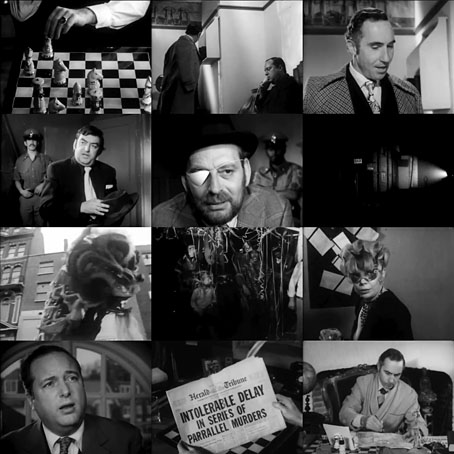The Spider’s Stratagem (1970) is Bernardo Bertolucci’s adaptation of the Jorge Luis Borges story The Theme of the Traitor and the Hero; Death and the Compass (1992) is Alex Cox’s adaptation of the story Death and the Compass by the same author; Spiderweb (1977) is an earlier adaptation of Death and the Compass which is both shorter than Cox’s film, and also a more successful Borgesian drama.
Borges’ story plays Kabbalistic games with the familiar shapes of detective fiction, creating its frisson in the tension between an elaborate murder mystery and the intellectual puzzle which leads to its solution. In Cox’s extended version this is presented in an overbearing style reminiscent of Terry Gilliam at his most exasperating; despite a decent cast it’s also rather poorly directed in places. By contrast, Paul Miller’s adaptation runs for 30 minutes and conveys the story very smartly and efficiently. The setting is “Borghesia” rather than Argentina but the general style is that of a Hollywood detective story, American accents and all. The always reliable Nigel Hawthorne plays the cerebral detective Erik Lönnrot. Considering this was a graduation film it’s an excellent piece of work which the director himself has made available on YouTube. Watch it here.
Previously on { feuilleton }
• The Library of Babel by Érik Desmazières
• Books Borges never wrote
• Borges and I
• Borges documentary
• Borges in Performance


Cox’s original 50-odd minute version as shown on BBC2 is far better than the extended one. So much so in fact, that after watching the DVD, I ripped it and re-edited out all the superfluous material rather than sit through it all more than once. I’d agree with you though, that ‘Spiderweb’, (which appears as an extra on the DVD), is much more in keeping with Borges when compared to Cox’s mashup of Gilliam, Jodorowsky and the Dick Tracy movie but at the time, I was just pleased to see a Borges adaptation on the TV. I suppose satisfyingly representing Borges on the screen is even more difficult than doing Lovecraft justice.
I liked the fact that he’d tried to do something different with the story, but it was poorly done in many places, at least until they get away from the city. I agree about the shorter version being better. The trouble with a radical take on this particular story is that it’s already a radical take on (and comment on) the standard detective story. Bertolucci’s film didn’t have the same problem since it merely applied Borges’ universal theme to a new setting.
There are some other short Borges adaptations made for TV, I have them on video but haven’t found them online yet. The South was one of them, pretty good as I recall, as was Emma Zunz.
As a PS to the post, I ought to have mentioned that Borges chose this story as the opening piece in his Personal Anthology (a collection of his own prose and poetry) so he obviously thought highly of it.